Last Updated on January 27, 2025
Want to make your own relaxing herbal extract from lemon balm? Here’s what to know about how to make lemon balm tincture from fresh or dried lemon balm and lemon balm tincture benefits.
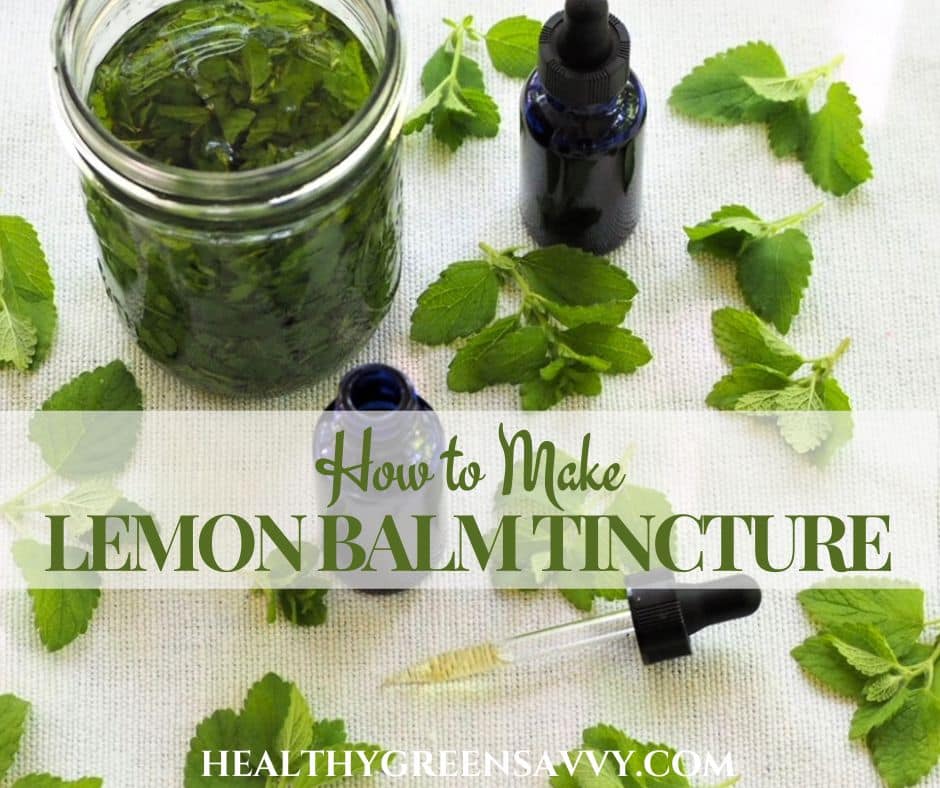
WHAT IS LEMON BALM TINCTURE?
If you haven’t made tinctures before, they may sound a bit intimidating. But if you can brew a cup of tea, you can make your own lemon balm tincture. Tinctures are just herbal extracts we make by steeping herbs — in this case, lemon balm leaves — in alcohol for 4 to 6 weeks. You can also use vinegar or glycerine if you want to make an alcohol-free extract.
Different solvents will extract different compounds. Plants steeped in water for tea, in alcohol for tincture, in vinegar for herbal vinegar, or in glycerin for glycerites will yield slightly different compounds in the final product. You can also infuse honey. Some herbs are extracted in oil for external use.
The Herbal Academy explains:
Using a solvent like alcohol, vinegar, or glycerin, you can extract a greater spectrum of the whole plant and preserve the medicine much longer than an infusion or a decoction. Alcohol is especially an excellent solvent that extracts a wide range of plant properties and allows for easy absorption of healing compounds into the bloodstream.
Home herbalists tend to use what’s called the “folk method” of tincture making, making rough measurements and producing tinctures with more variability. If you’d like more precision and consistency, use the “weight to volume” method.
Is getting more knowledgeable about using herbs on your bucket list? Check out the fantastic courses you can take online with the Herbal Academy. Find out more about their offerings here or by clicking the banner above.
WHY MAKE LEMON BALM TINCTURE?
While lemon balm tea is lovely, we can extract different compounds from medicinal plants when we use different solvents. Water, alcohol, vinegar, and glycerine will all yield lemon balm herb preparations with slightly different constituents from the plant.
While you could buy your lemon balm tincture for $10-15 per ounce, you can make your own for about 50 cents per ounce using organic vodka and organic lemon balm.
LEMON BALM TINCTURE BENEFITS
Herbalists recommend lemon balm for soothing stress and anxiety, lifting the spirits, and promoting sleep. A relaxing nervine, it also has antispasmodic properties and may help relieve muscle tension and stomach cramps. It also has antiviral compounds and is often recommended for treating cold sores.
Studies suggest that lemon balm may help combat stress and improve mood.
In Body into Balance herbalist Maria Noel Groves touts lemon balm’s usefulness for calming nerves, improving cognitive function and mood, and supporting digestion. Learn more about additional benefits and uses for lemon balm besides lemon balm tincture.
Herbalist Matthew Wood describes lemon balm as “cooling and sedative” as well as “nerve-calming.” He writes, “These powers are much more pronounced than the plant is tinctured fresh.”
CAUTIONS WITH LEMON BALM TINCTURE
Lemon balm may affect thyroid function, so be sure to discuss using lemon balm with your doctor if you have thyroid-related issues.
Groves cautions that lemon balm is “generally quite safe, but it should be used in pregnancy only with supervision and may (rarely) aggravate hypothyroid disease.”
As is the case with most herbs, lemon balm’s safety for pregnant women hasn’t been studied, so most sources advise avoiding it during pregnancy.
Certain people may have an allergic reaction to lemon balm. Whenever you use an herb for the first time, always try a very small amount to be sure you don’t have a reaction.

FRESH OR DRIED LEMON BALM?
While it’s fine to make tinctures with dried plant material, many herbalists strongly prefer the fresh plant, which will contain volatile oils that dissipate when a plant is dried. While you can make lemon balm tincture with dried lemon balm, you’ll extract slightly different compounds than if you use fresh.
WHERE TO GET LEMON BALM FOR TINCTURE
Option 1: Grow Your Own
Growing your own lemon balm is easy and fun, whether you add it to a perennial bed or your medicinal herb garden. Lemon balm’s bright green leaves make it a good accent plant, and it requires little care besides trying to keep it under control.
Lemon balm doesn’t spread as aggressively as some other members of the mint family, but gardeners in warmer climates may find it invasive, especially if you’re not careful to cut it back before it flowers.
If you’d like to grow lemon balm, I recommend getting a division from another gardener (a top way to get plants free. You can also buy a nursery plant or seed packet, which will contain many more lemon balm seeds than you’re likely to need. Share your extras with other gardeners or donate them to a seed library.
Option 2: Buy Dried Lemon Balm Leaf
You can purchase dried lemon balm leaf in bulk, by the pound, or in smaller quantities from places like Mountain Rose Herbs and Etsy. Leftover lemon balm can be enjoyed in lemon balm tea, a tasty infusion that can help encourage better sleep. Here’s how to make lemon balm tea from fresh or dried lemon balm.
SUPPLIES NEEDED FOR LEMON BALM TINCTURE
- Fresh or dried lemon balm (buy here)
- Sterilized glass jar (amber glass jars block light, but not necessary if you keep steeping tincture in a cabinet)
- High proof alcohol (minimum 40%, or 80 proof, but higher is preferred), typically vodka, though you can also use grain alcohol; alternatively, use food-grade glycerin or vinegar if you don’t want to use alcohol
- Amber or blue bottles with droppers (like these or these)
- Fine mesh sieve
- Funnel
- Cheesecloth to strain out the smallest pieces of plant material, which makes a longer-lasting finished product
I usually use organic vodka made by a local distiller. It’s a bit more expensive than the big commercial brands, but a bottle of vodka makes A LOT of herbal tincture, and I like supporting organic practices and local producers. If you can’t find organic vodka, though, I wouldn’t worry too much about it, as you’ll be taking such tiny amounts when you use it.
Most of the vodka I’ve found is 80-proof, with maybe one option for 90-proof in a non-organic brand. Higher-proof alcohol is considered better for tincturing fresh herbs, so if you’re using fresh lemon balm and 80-proof alcohol, let your lemon balm leaves dry out for a few hours on a clean dish towel before tincturing. The moisture is less of a concern with higher-proof alcohol.
–>Do not use rubbing alcohol (isopropyl alcohol), which should never be taken internally.
If you want to know more about choosing solvents, I recommend this article.
HOW TO MAKE LEMON BALM TINCTURE
Ready to make your own lemon balm tincture? Here’s how:
HARVESTING LEMON BALM
It’s generally recommended to harvest herbs before they flower. In Making Plant Medicine, Rico Cech recommends harvesting lemon balm in the early flowering stage. Mid-morning is the preferred time for collecting herbs, after the dew evaporates.
If you’re lucky with your timing, you can harvest following a good rain, after the plants have had a chance to dry. Then you don’t need to rinse the lemon balm before processing. Just give them a good shake to dislodge any insects.
Some people don’t bother rinsing herbs before using, since you want to avoid additional moisture when tincturing fresh plants. But I find if it hasn’t rained for awhile, everything has a coating of dust that I prefer to keep out of my tinctures. So if it hasn’t just rained, I rinse after harvesting, then let the leaves dry on a kitchen towel before making tincture. If it’s a moist plant, I’ll let them dry after chopping for a little while as well.
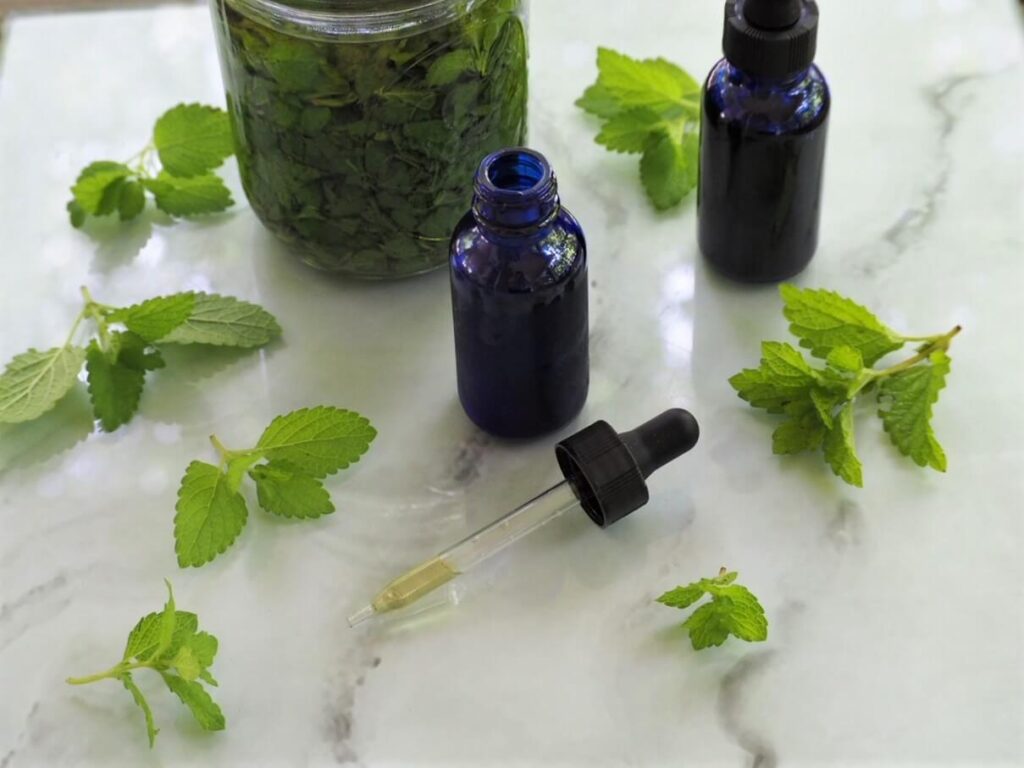
INSTRUCTIONS
1. If using fresh lemon balm, rinse to remove dirt or insects. Strip leaves from the stem and let them dry on a clean cloth. A quick spin in salad spinner helps to dry them more quickly.
2. When leaves are fully dry, chop into small pieces in order to expose as much possible surface area.
3. Place chopped lemon balm or dried lemon balm in a clean, dry jar. There are differing opinions about how much fresh herb to put in your jar. While some herbalists tell you not to pack in your herbs, others suggest you do. If using fresh lemon balm, fill the jar approximately two-thirds full, or pack it in to the top, depending on which school of thought you want to follow. Cover completely with your chosen solvent (alcohol, vinegar, or glycerin). If using dried lemon balm, fill only halfway, as it will expand as it absorbs liquid, and cover to about two inches above the herb.
This video from herbalist jim mcdonald explains more about how packing your herb to the top of the jar can help you make more powerful herbal extracts.
4. Cover your jar of herb and solvent and seal tightly. Shake gently and then let the herb settle for about an hour. If necessary, add more liquid so herbs are completely covered, then seal and give another gentle shake.
5. Place your macerating lemon balm in a cabinet for 4 to 6 weeks, shaking gently every day or so. Make sure the lemon balm is completely submerged in liquid. Note the finish date on your calendar or put a reminder on your phone so you remember to strain your tincture when it’s ready.
6. After 4 to 6 weeks, decant your lemon balm tincture. Layer cheesecloth on a sieve and strain into a bowl or large measuring cup (helpful for pouring without spilling any of your precious tincture).
7. Give the cheesecloth a good squeeze to get as much of the liquid as you can. Discard the plant material.
8. Allow the tincture to settle for about 24 hours. If it looks like there’s still some plant material, strain it again through a coffee filter.
9. Fill your tincture bottles using a small funnel. Label with the contents and the date.
HOW TO USE LEMON BALM TINCTURE
Guidelines for using herbal preparations like lemon balm tincture can vary quite a bit. You’ll often see an entire dropperful of tincture in water recommended several times per day, while some herbalists advise placing just three drops under the tongue.
To tailor your use of lemon balm tincture to your own specific needs, consult a qualified herbalist.
Rico Cech recommends taking tinctures between meals to maximize absorption. He advises that smaller people typically require less herb than larger people, and that acute conditions require more frequent consumption of herb than chronic conditions.
Since herbs can interact with medications and health conditions, it’s important to speak to your doctor before trying new herbs.
FAQS
I DON’T USE ALCOHOL. CAN I STILL MAKE LEMON BALM TINCTURE?
Yes! While it won’t technically be called a tincture, you can make a lemon balm extract using glycerin or vinegar, as described above.
HOW LONG DOES LEMON BALM TINCTURE LAST?
Alcohol-based tinctures stored in a cool, dark place keep for several years. Herbal vinegars keep for about 6 months in a cabinet, and longer in the refrigerator.
Here’s more on the shelf life of herbal preparations from the Herbal Academy.
I FORGOT TO STRAIN MY TINCTURE! CAN I STILL USE IT?
Most instructions for making your own tinctures list 4 to 6 weeks as the time needed for extraction. However, if you ask herbalists, they’ll tell you sometimes their tinctures didn’t get strained for many months and they used it anyway.
I HAVE A LOT OF ALCOHOL LEFT. WHAT CAN I USE IT FOR?
If you’re not going to use it for cocktails, keep your leftover vodka for tincturing the many other wonderful herbs you’ll find growing throughout the season. The large bottle of vodka I bought made plenty of stinging nettle tincture, goldenrod tincture, pine needle tincture, elderberry tincture, violet tincture, elderflower tincture, ground ivy tincture, and California poppy tincture, to keep me supplied for years. It’s so nice to have these plant medicines during the six months each year that nothing’s growing!
Make smaller or larger quantities depending on how much you think you will use and place smaller amounts in dropper bottles.
Expand your herbal knowledge with the wonderful herbalism books below. Or explore more of the best herbal medicine books for your home library.
Curious to learn more about using common medicinal plants? Check out these popular posts:
Save this lemon balm tincture recipe for later!
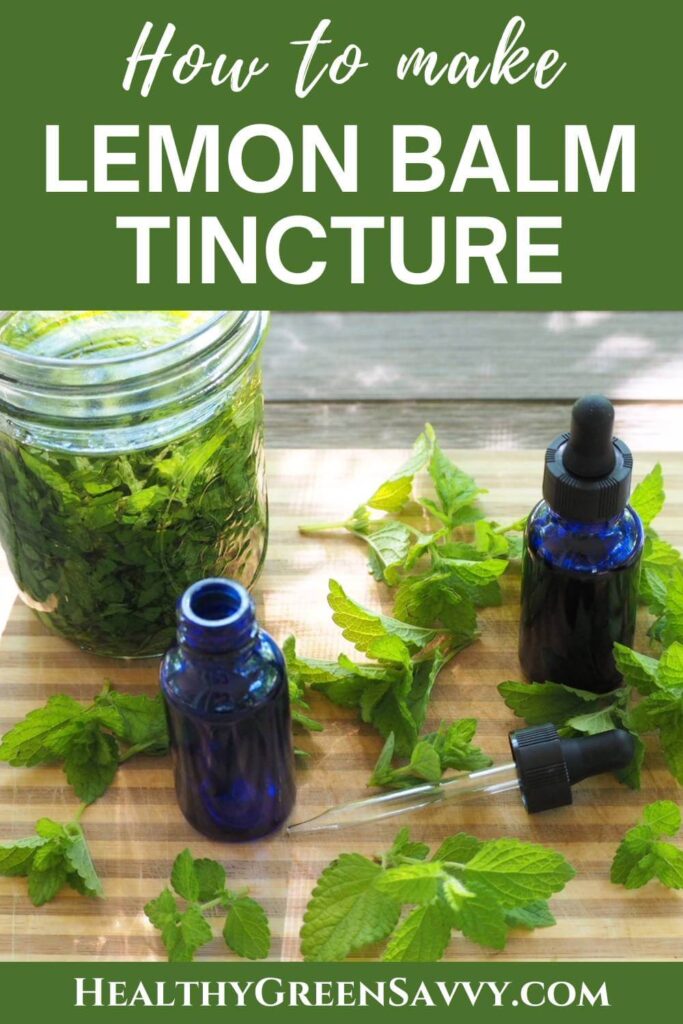
Disclaimer: I’m a health enthusiast, not a medical professional. Content on this website is intended for informational purposes only and is not meant to provide personalized medical advice. I draw on numerous health sources, some of which are linked above. Please consult them for more information and a licensed professional for personalized recommendations.
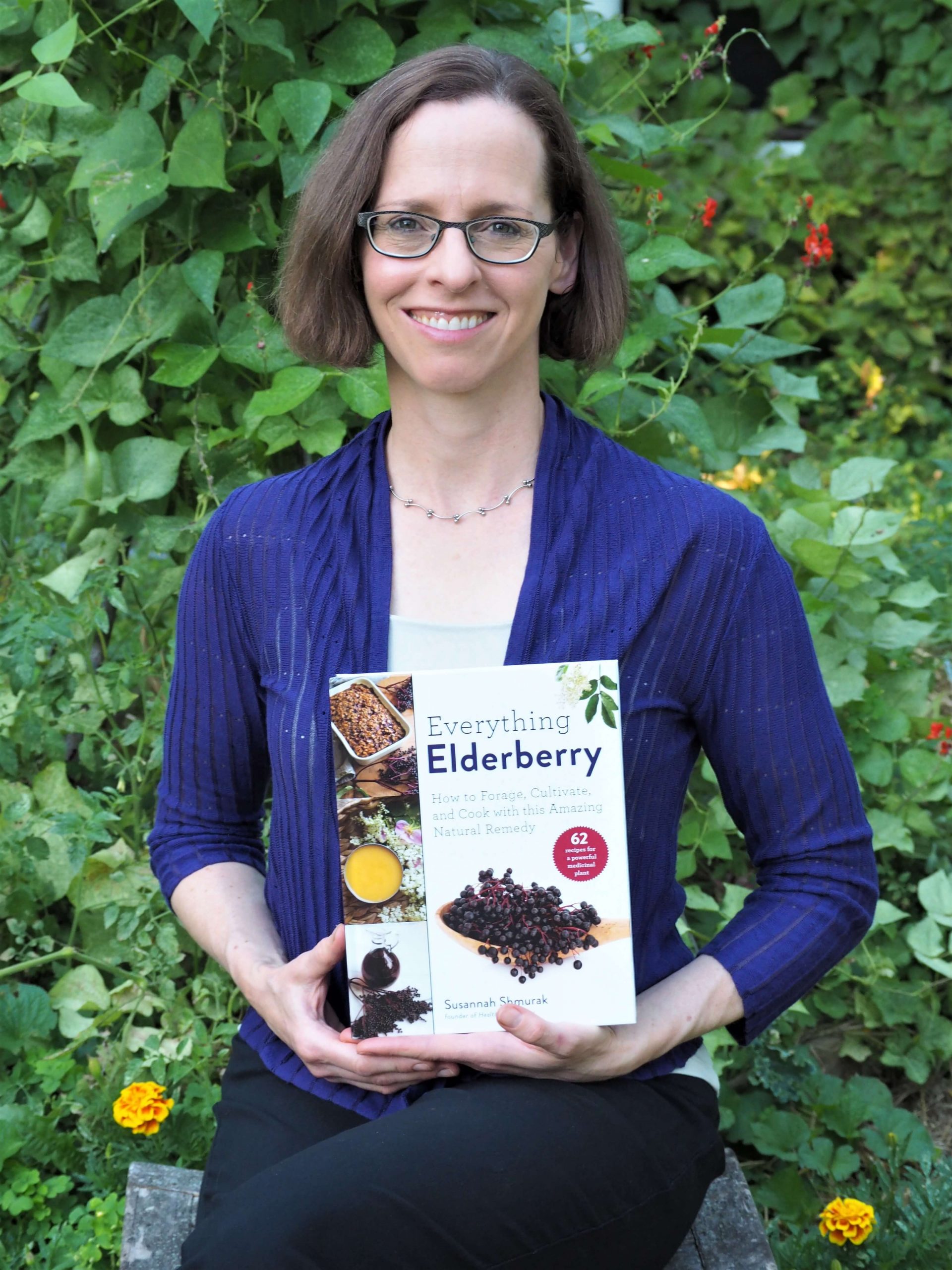
Susannah is a proud garden geek and energy nerd who loves healthy food and natural remedies. Her work has appeared in Mother Earth Living, Ensia, Northern Gardener, Sierra, and on numerous websites. Her first book, Everything Elderberry, released in September 2020 and has been a #1 new release in holistic medicine, naturopathy, herb gardening, and other categories. Find out more and grab your copy here.

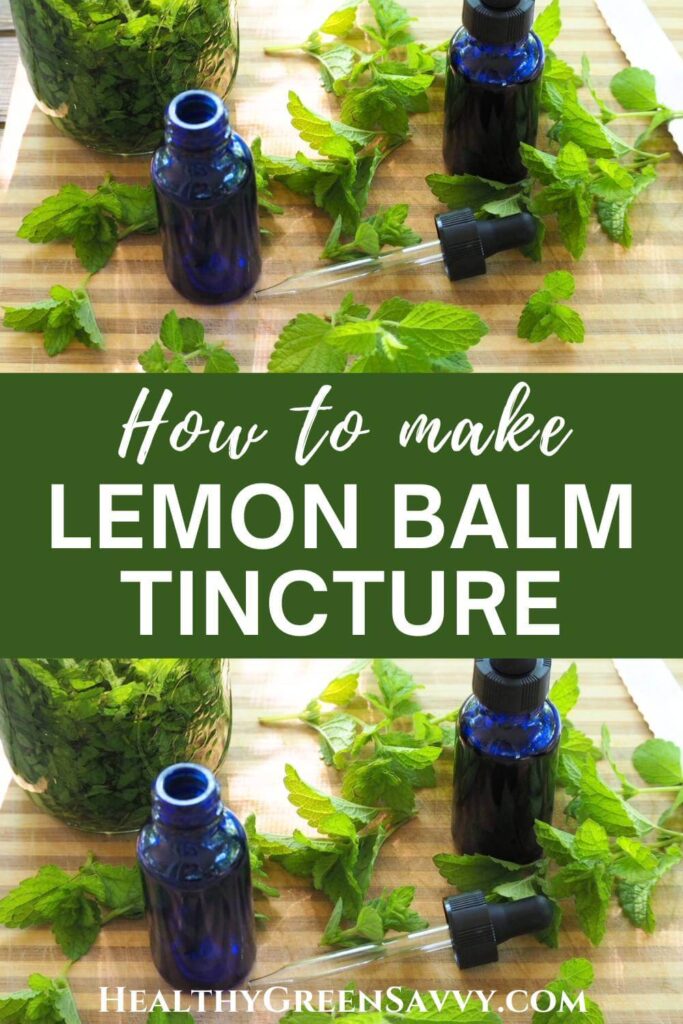


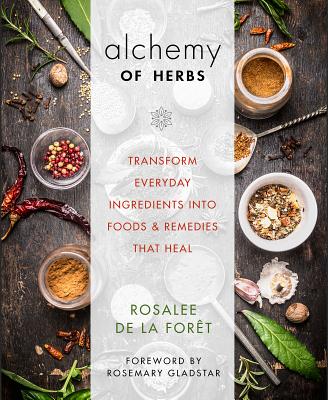
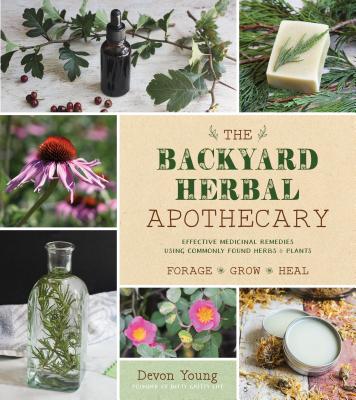

 Hi, I'm Susannah, a garden geek, energy nerd, and fan of healthy food and natural remedies. Need some simple, practical solutions for living healthier and greener? You've come to the right place! More about me and my green projects
Hi, I'm Susannah, a garden geek, energy nerd, and fan of healthy food and natural remedies. Need some simple, practical solutions for living healthier and greener? You've come to the right place! More about me and my green projects
Leave a Reply